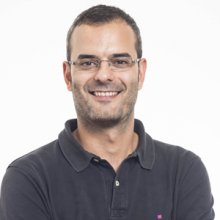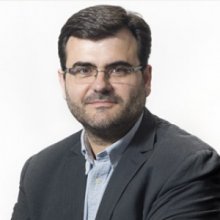Images
Participants



Contact

For the fourth consecutive year, the CosmoCaixa will bring together researchers from all over the world to participate in a B·Debate, an initiative of Biocat and the Obra Social “la Caixa”. To be held on 13 and 14 October, this B.Debate organized by IRB Barcelona scientists, will address the latest advances in cancer
The morphology of the tumour cell changes when the cell migrates from one site to another, thereby allowing the cell to evade regulation and thus facilitating metastasis
Cancer relapses after chemotherapy are caused by tumour stem cells that survive the treatment
On 13 and 14 October, on the occasion of a B·Debate, an initiative promoted by Biocat and Obra Social “la Caixa”, national and international experts in epigenetics and cancer will come together for the fourth consecutive year at the CosmoCaixa to talk about gene regulation mechanisms and cancer epigenetics.
This year the Institute for Research in Biomedicine (IRB Barcelona) will head a new Barcelona Conference on Epigenetics and Cancer (BCEC). Among the most prominent international authorities participating, special mention is given to John Dick, researcher at the University of Toronto (Canada), the scientist that discovered cancer stem cells, and Rick Young, researcher at the Massachusetts Institute of Technology (US), a pioneer in the 3D architecture of genes and chromosomes and whose name is believed to figure among those up for the Nobel Prize in Medicine.
These and other experts will debate epigenetic regulation, RNA transcription factors, stem cell biology, and the tumour microenvironment. The scientists will discuss how data on the tumour genome furthers understanding of the cell reprogramming that occurs during the spread of cancer.
The instruction manual for each person is held in the genome, and alterations to any of the genetic pieces that form the genome can cause disease. Cancer is caused by a series of mutations in healthy cells which allow them to evade cell regulation and to proliferate in an uncontrolled manner. Changes in the morphology of the tumour cell changes when the cell migrates from one site to another allow it to evade regulatory mechanisms, thus allowing metastasis.
Tumour cells are not all the same. In this regard, some are resistant to treatment and cause relapse. Cancer stem cells are like weeds in a garden that sprout again. These kinds of cell are commonly responsible for the long-term maintenance of cancer and for relapse after chemotherapy. A tumour with few stem cells has a better prognosis than one with many.
However, in recent years, researchers have also turned their attention to how lifestyle can influence the onset of cancer. For example, diet, smoking, and sedentary habits are among the factors that may contribute to the development of the disease. This new level of cell regulation, called epigenetics, widens the scope of research into cancer and treatment of the same.
The full programme of the B·Debate “Beyond Cancer Genomes. Barcelona Conference on Epigenetics and Cancer” is available here.
About IRB Barcelona
The Institute for Research in Biomedicine (IRB Barcelona) pursues a society free of disease. To this end, it conducts multidisciplinary research of excellence to cure cancer and other diseases linked to ageing. It establishes technology transfer agreements with the pharmaceutical industry and major hospitals to bring research results closer to society, and organises a range of science outreach activities to engage the public in an open dialogue. IRB Barcelona is an international centre that hosts 400 researchers and more than 30 nationalities. Recognised as a Severo Ochoa Centre of Excellence since 2011, IRB Barcelona is a CERCA centre and member of the Barcelona Institute of Science and Technology (BIST).




